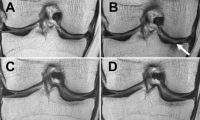
Summary:Overweight and obese people who lost a substantial amount of weight over a 48-month period showed significantly lower degeneration of their knee cartilage, according to a new study.
Overweight and obese people who lost a substantial amount of weight over a 48-month period showed significantly lower degeneration of their knee cartilage, according to a new study published online in the journal Radiology.
According to the National Institutes of Health, obesity is a risk factor for osteoarthritis. Being overweight or obese can place extra pressure on joints and cartilage, causing them to wear away. In addition, people with more body fat may have higher blood levels of substances that cause inflammation in the joints, raising the risk for osteoarthritis.
“For this research, we analyzed the differences between groups with and without weight loss,” said the study’s lead author, Alexandra Gersing, M.D., from the Department of Radiology and Biomedical Imaging at the University of California, San Francisco. “We looked at the degeneration of all knee joint structures, such as menisci, articular cartilage and bone marrow.”
The research team investigated the association between weight loss and the progression of cartilage changes on MRI over a 48-month period in 640 overweight and obese patients (minimum body mass index [BMI] 25 kg/m2) who had risk factors for osteoarthritis or MRI evidence of mild to moderate osteoarthritis. Data was collected from the Osteoarthritis Initiative, a nationwide research study focused on the prevention and treatment of knee osteoarthritis. Patients were categorized into three groups: those who lost more than 10 percent of their body weight, those who lost five to 10 percent of their body weight, and a control group whose weight remained stable.
The results showed that patients with 5 percent weight loss had lower rates of cartilage degeneration when compared with stable weight participants. In those with 10 percent weight loss, cartilage degeneration slowed even more.
Not only did the researchers find that weight loss slowed articular cartilage degeneration, they also saw changes in the menisci. Menisci are crescent-shaped fibrocartilage pads that protect and cushion the joint.
“The most exciting finding of our research was that not only did we see slower degeneration in the articular cartilage, we saw that the menisci degenerated a lot slower in overweight and obese individuals who lost more than 5 percent of their body weight, and that the effects were strongest in overweight individuals and in individuals with substantial weight loss,” Dr. Gersing said.
Light to moderate exercise is also recommended to protect against cartilage degeneration in the knee.
“Our study emphasizes the importance of individualized therapy strategies and lifestyle interventions in order to prevent structural knee joint degeneration as early as possible in obese and overweight patients at risk for osteoarthritis or with symptomatic osteoarthritis,” Dr. Gersing said.
More:Science







Leave a Reply
You must be logged in to post a comment.